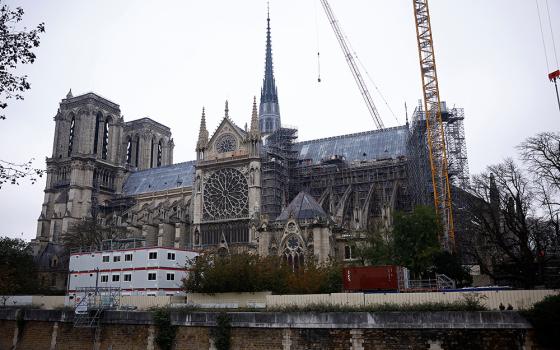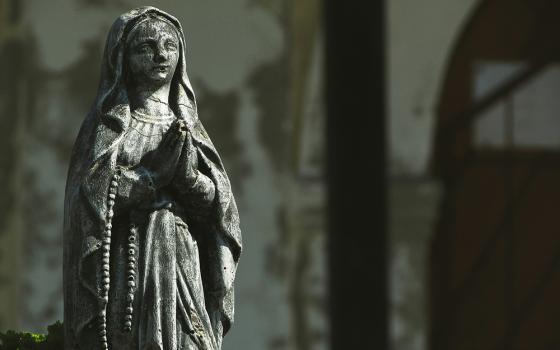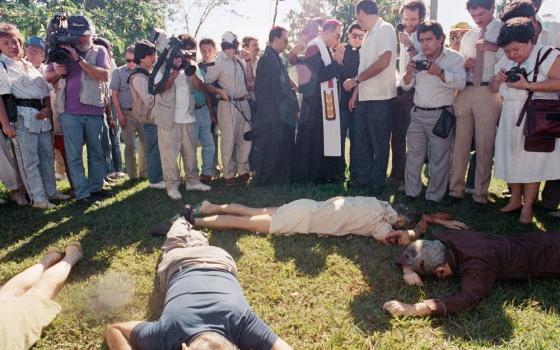July 22 marks the feast day of St. Mary of Magdala, and celebrations are being held across the United States and in Canada, Australia and Sweden to honor the saint once wrongly thought to be a reformed prostitute and now recognized as “the apostle to the apostles.”
For the past 11 years, FutureChurch, a church reform organization based in Cleveland, Ohio, has spearheaded the celebrations to correct people’s lingering misconceptions of the saint and to garner attention for the way Mary of Magdala and other biblical women are role models for women in ministry.
This year, FutureChurch is asking celebrants to send postcards to the Vatican to ask that female biblical scholars be included in the upcoming International Synod on the Word to be held Oct. 5-26 in Rome. The synod of bishops will discuss “The Word of God in the Life and Mission of the Church.”
In addition to asking for the inclusion of female biblical scholars at the synod, FutureChurch is asking synod leaders to devote more pastoral attention to Jesus’ inclusive ministry to women, to provide more preaching opportunities for women and to restore Biblical women’s role in the lectionary in cases where they have been minimized or deleted from church readings.
Many of the approximaly 261 celebrations honoring Mary of Magda this summer will be held today, in cities and towns ranging from Naples, Fla., to Ames, Iowa to San, Diego Calif., and Ester, Alaska. Sr. Christine Schenk, executive director of FutureChurch, said the celebrations touch something in women’s psyche today that longs to know more about women’s roles during Jesus’ time.
The interest in St. Mary of Magdala is not exclusively Catholic, Schenk said. Every year some celebrations are organized by Protestant women, and a great many of the celebrations are held in Protestant churches. The celebrations provide an opportunity for women to preach and to play a visible liturgical role, Schenk said.
“Many women unconsciously internalize that they must be not as good as men because we never see ourselves on the altar. And of course you have all the teaching coming down from Rome that Jesus chose only men as apostles,” Schenk said.
Schenk said FutureChurch has seen the number of celebrations grow from 23 in 1997, the first year celebrations were held, to 150 the year after, to its present number of between 200 and 300 annually.
“There’s a healing process going on among women,” Schenk said. “I think that’s why people look forward to it. Anytime you have a marginalized group that’s in the process of getting incorporated into the mainstream, there’s a big release of energy.”
Schenk notes that female biblical scholars look at scripture through a different lens than men and are now asking questions that have never been asked before because up to the last 50 years almost all biblical scholars were men. “The feminists’ understanding of scripture and of Jesus’ inclusive practice is one of the hottest areas of biblical study,” she said.
Although FutureChurch sends a packet of materials to those organizing local Mary of Magdala events, the celebrations can and do take a variety of forms. This year FutureChurch is suggesting celebrants focus on the hidden women of the lectionary and has sent out materials that highlight that role. The materials draw attention to the role of such figures as Phoebe, a deacon of the church in Cenchreae; Prisca, a co-worker with St. Paul; Miriam and Judith of the Old Testament; Mary of Bethany, who washed Jesus’ feet; and, of course, Mary of Magdala herself, a prominent, wealthy woman to whom the resurrected Jesus made his first appearance.
Contempory women can find learning about women’s early discipleship in the Christian story very affirming, Schenk said. “Once you begin to see someone who looks like you in those texts, it has a whole different meaning,” she said.
Click on FutureChurch for a list of Mary of Magdala events.



